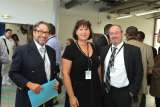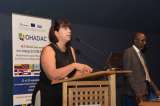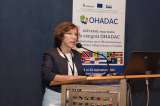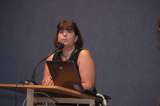 The OHADAC Convention held on 21-22 September 2015 saw speeches from Françoise Andrieux, judicial officer and President of the International Union of Judicial Officers and Nicole Souletie, Administrative and Financial Director of the Foundation for Continental Law.
The OHADAC Convention held on 21-22 September 2015 saw speeches from Françoise Andrieux, judicial officer and President of the International Union of Judicial Officers and Nicole Souletie, Administrative and Financial Director of the Foundation for Continental Law.
Françoise Andrieux presented “The Global Code of Enforcement”. After reminding participants that there could not be efficient law without enforcement, she explained that the International Union of Judicial Officers (UIHJ) comprises 88 member countries. The organization is engaged in numerous actions that have a significant impact and that is the institution is a legitimate body for the production of democratic standards for the enforcement of legal decisions.
She explained that her organization meets for an international congress every three years and that the events held in Tunisia and Washington had laid the foundations for a universal enforcement law, which in turn led to the adoption of the Global Code of Enforcement at the Madrid Congress in 2015. Since then, this Code becomes relevant in the context of the internationalization of disputes.
 She recalled that the “Doing Business” report put emphasis on the enforcement of legal decisions and insisted that companies are only able to develop their business if guarantees exist and are conducive to a climate of trust between economic operators and that an effective enforcement system promotes legal certainty.
She recalled that the “Doing Business” report put emphasis on the enforcement of legal decisions and insisted that companies are only able to develop their business if guarantees exist and are conducive to a climate of trust between economic operators and that an effective enforcement system promotes legal certainty.
Françoise Andrieux explained that her organization focuses on regulations that are easily transferable, as it is important to offer models and standards for defining ideal enforcement procedures that are implemented in accordance with the legal traditions of States.
She pointed out that 12 professors specializing in enforcement law (representing all continents) produced the Global Code of Enforcement, with three major steps being cared for:
- the knowledge of substantive law,
- understanding of the texts,
- the need to find the least common denominators presented in the Global Code of Enforcement.
The code was presented for the first time in Togo so as to establish a link with the OHADA.
 She explored the future of the Global Code of Enforcement, which comprises 34 articles and acts as a tool for good governance, recalling that “the future is a convenient place for dreams.”
She explored the future of the Global Code of Enforcement, which comprises 34 articles and acts as a tool for good governance, recalling that “the future is a convenient place for dreams.”
She added that there can be various methods for enforcing legal decisions, including mediation, and that the Global Code of Enforcement offers an innovative, qualitative approach, particularly for participative enforcement and the controlled introduction of new technologies, etc.
She concluded by explaining that the guiding principles of the Global Code of Enforcement aimed to create a global legal culture, with its main objective being the concrete application of the code.
Nicole Souletie spoke on the “Experience of the Foundation for Continental Law”, evoking the partnership been between the Foundation and the Henri Capitant Association of Friends of French Legal Culture.
 She explained that, since its creation in 2007, the Foundation for Continental Law had given training sessions on private law to 150 students, with all of these students contributing to the standing of the Foundation in their home countries upon their return.
She explained that, since its creation in 2007, the Foundation for Continental Law had given training sessions on private law to 150 students, with all of these students contributing to the standing of the Foundation in their home countries upon their return.
She added that meetings are organized between professionals and academics in the Mediterranean and that there exists an international network of 14 chairs of continental law, with investigations underway into the possibility of creating a 15th chair in a Caribbean country.
She concluded by explaining that ACP Legal and the Foundation had combined their efforts to develop international support actions and that these combined actions result from a community of values.
For further information, please contact:
Dr. Jean Alain Penda
Email: japenda@ohadac.com
Published on 2015-10-30, 9:59 am


















